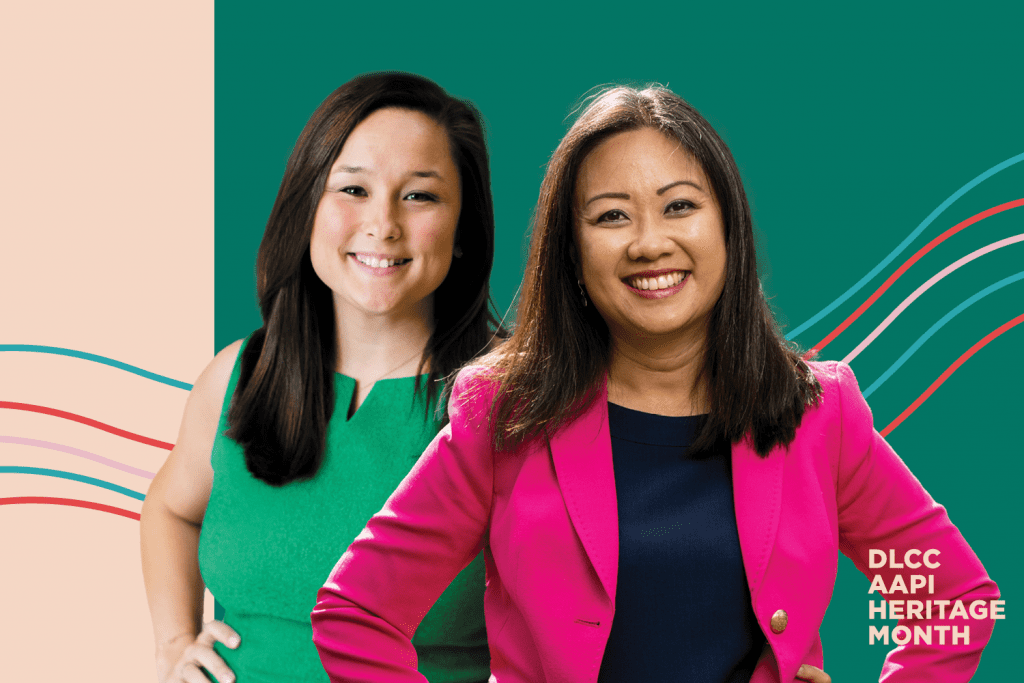
CW: Racial slurs
May is Asian American and Pacific Islander Heritage Month, a chance to recognize and honor the many contributions the AAPI community has made in the United States and confront the layers of discrimination that persist. This year, as incidents of anti-Asian hate have reached a record high, the DLCC brought together two Asian American legislators for an honest conversation about representation, community, & struggling with personal identity.
Kathy Tran is a member of the Virginia House of Delegates. Cyndi Munson is a member of the Oklahoma House of Representatives and the leader-elect of the Democratic caucus. This is their truth.
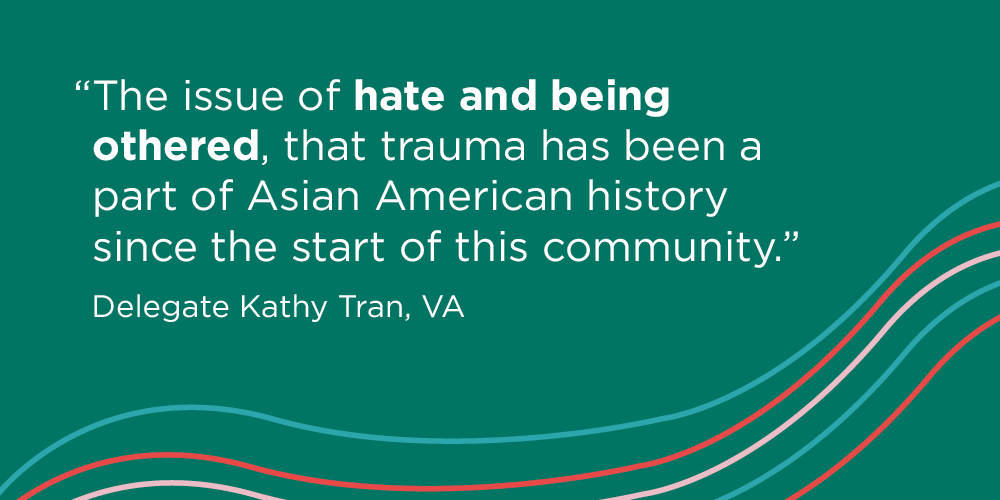
Delegate Tran: The issue of hate and being othered, that trauma has been a part of Asian American history since the start of this community. Whether you go back to the Chinese Exclusion Act, the Japanese internment during World War II, the targeting of the Sikh community after 9/11 — it’s nothing new. However, I think what we have seen this past year, it’s this intersection of being othered, being scapegoated, of misogyny, and the stereotypes that Asian American women face daily. It’s been really difficult for me personally.
Just a couple of weeks ago there were those attacks in the San Francisco Bay area on elderly women who were just walking down the street waiting for the bus. It’s really incredible — the personal nature of the violence that’s happening. It’s like street warfare. But I think it’s also galvanizing in terms of the community speaking up and the allyship and coalitions that are coming together with our Black community, with our Brown community members to say, “Hey, nobody should be facing hate and violence and this type of intimidation.”
There are so many national groups that are working overtime, and some that are newly forming as well. We just had the launch of the Asian American Foundation last week, just an incredible investment into the AAPI community. We’re going to move from dealing with the trauma to a galvanizing force and you’re going to see us continue to turnout at the polls. We had record numbers coming out to vote in 2020. We were part of the margin of victory in Georgia, both for the presidential election as well as for the Senate races. I think you’re going to continue seeing us be engaged and demanding a seat at the table in representation.
On the policy side and what’s happening in the states, I’m really excited there are going to be a couple of different groups who are working in the space trying to figure out what is good legislation to put forward addressing discrimination. Not just hate crimes, but also legacy issues such as language access and culturally competent services — and a history curriculum that tells the story of all Americans and not just a few. I’m really excited about that.
In Virginia, there are five AAPI state legislators and we have formed a caucus this year to be able to have a platform and be organized and work together. There’s been so much excitement from the community in terms of that formation and what we’re going to see next. We’ve had a couple of listening sessions with community members, and now we’re getting ready to roll out a legislative framework to share with folks about next steps into the 2022 election.
Leader-Elect Munson: I’m the first Asian American woman to ever be elected to the Oklahoma legislature and so I certainly carry that with me. I think one of the hardest parts of being the first is just not having anyone who looks like you, who has gone through the challenges and the obstacles — but also the opportunities that you get to go through and glean through their experiences. But I look forward to showing all Oklahomans — especially young women and young women of color — that they are absolutely capable of doing anything they set their minds to and to push back against our own inner critics and our imposter syndrome that regularly bubbles up because we haven’t seen people who look like us do the jobs that we’re doing.
I want to give you a little background on my lifetime struggle of identifying as a Korean American woman. My dad ultimately raised my sister and I because my mother — who is from South Korea — they divorced when I was 13. She was verbally and physically abusive, so we have a very estranged relationship and I’m working through it as I get older. At the beginning of the pandemic, when Donald Trump was calling the coronavirus the “China virus” and blaming Asian Americans and Asians for COVID-19, my mom called me and told me how terrified she was and said, “They’re going to blame us. This is another chance for them to blame us.” My mom rarely gets that vulnerable, and we don’t really talk that often. For her to call me and say those things helped me to realize how serious it was and the fear for all of us. Because I’m Korean, but also, my dad is a white guy from Cincinnati, Ohio, many people are confused about who I am. They ask me those questions all the time, “I can’t quite put my finger on — are you Native American?” They’re always questioning who I am, and that has been a constant struggle my entire life — that feeling of not belonging and people not knowing what your identity is.
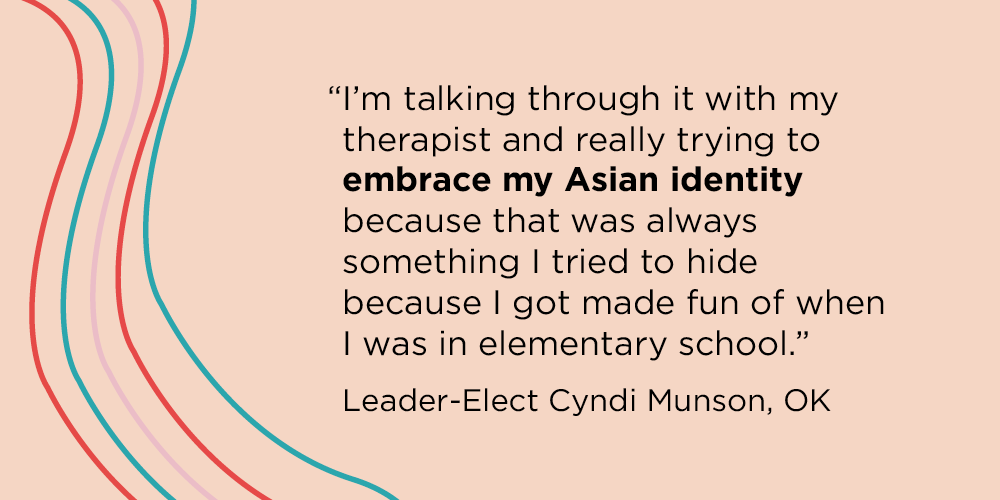
This year has really been an interesting time, especially being home. We’re all processing things, we’re all facing the things we’ve been ignoring by being busy and being out and about. To be honest, I’m talking through it with my therapist and really trying to embrace my Asian identity because that was always something I tried to hide because I got made fun of when I was in elementary school. I was called a “chink” at five years old, and I internalized that hate against me very, very early on.
Recently, after the Atlanta shootings, we had an event here in Oklahoma City where a couple of organizations held a vigil. There were probably about seven or ten of us who got up and shared some of our personal experiences being Asian American and leading in our communities. We all had different backgrounds. One thing that continued to come up — I was never able to articulate it until I saw others talking about it — was all about basically hiding and being nice and being kind, just doing enough to get by, to not be noticed.
It was a really healing experience for me because I have never been in a room surrounded by people who look like me and who were that vulnerable and open about our identity. It was this little church and I had never really opened up that much to a room full of people where I knew some of them and then the others I didn’t know. I had numerous women, Asian women, who came up to me and said, “Your story is exactly like mine, and I have never been able to share that before.” So I have all these new friendships with women in my community. There’s one, she and I have been having like, Friday night backyard time, and really just sharing our struggle with our relationship with our moms and being who we are in our community and showing up. It’s been such an interesting journey for me and something that I feel like I have struggled with for so long and now it’s just kind of all in the open.
I did get a resolution passed in the House to say that we, as the Oklahoma House of Representatives, condemn the violence against Asian Americans and we stand with our AAPI communities here in Oklahoma. There are thriving communities, not just in Oklahoma City, but all across the state. Oklahoma City in particular — the Vietnamese community is very important and integral to the development of this city, and it’s often ignored or not talked about.
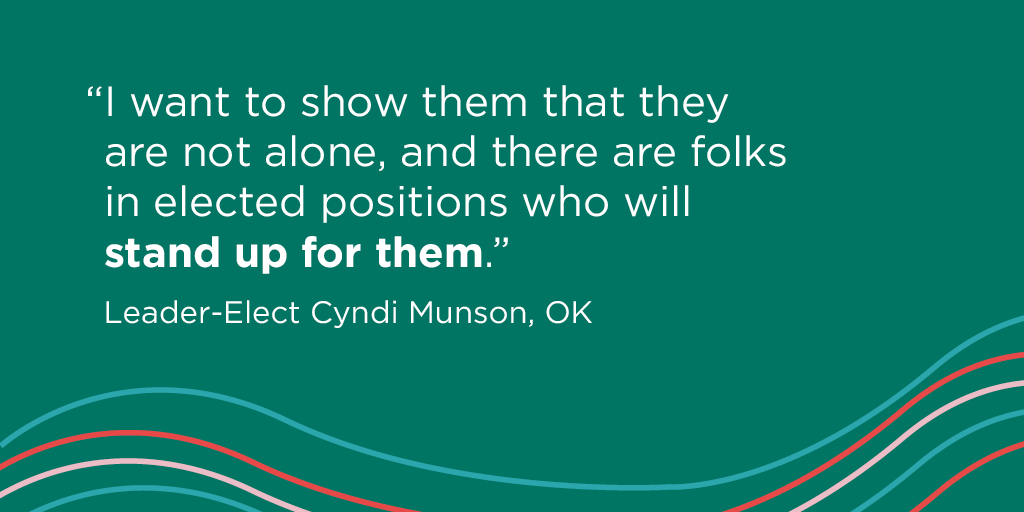
There are three of us now serving who are Asian American and we are going to start an Asian American caucus in Oklahoma. We’re trying to get that launched by the end of this month, and we’re very excited about it. It really bonded the three of us who serve in the House. To be someone who has never seen anyone who looks like me do this work — especially at the state level — it has meant a lot to find ways to connect and be a better representative for my community and also elevate those issues that so many families and individuals face in silence. I want to show them that they are not alone, and there are folks in elected positions who will stand up for them.
Through all the pain and everything that we are going through, and these stories in the news like Kathy mentioned in San Francisco, it’s heartbreaking to watch because you can see yourself. Even if they are older women, you can just feel — I don’t know — it’s too much. It’s hard to watch. It’s hard to read about. It is an honor to be able to stand up and do the work and find ways to heal together and come together to make a difference. It’s been an interesting year.
Delegate Tran: Cyndi, when you shared that you were called names as a child and how that stayed with you. I’m so sorry. This whole time has made me relive my own childhood and instances where like, you know the lunches I brought —
Leader-Elect Munson: Yes!
Delegate Tran: — and all sorts of things — it made me realize how often we internalize this issue of being othered, of being questioned when you’re really little. For a long time I thought, “Well, it’s okay. It’s just what people think.” But it’s actually not okay, and we need to stop normalizing it.
My 8-year-old son came home after they returned to in-school learning and said during lunch, he heard a child ask the lunch lady why the Chinese made and brought COVID, and why do Chinese people eat snakes and all those animals. And you can just see how kids absorb the things they learn and it passes on so easily. It’s made me realize how much of that we have internalized and passed on. At the beginning of COVID, in February 2020, my mom was visiting to help during session and she was leaving, and she had a little bit of a tickle in her throat — this was before any mask mandate or anything — but she was like, “Do you have a mask I can wear on the plane?” And I freaked out. I was like, “You are not going to wear a mask, because as soon as you — a little Asian American lady — put on that mask on that plane with all this talk about COVID and what’s happening, that is not going to be good for you to do that.” I was really concerned about her safety getting on that plane.
Leader-Elect Munson: Yeah. Being someone who is — like I said my mother’s from Seoul, South Korea, my dad’s from Cincinnati — there’s this constant feeling of not being enough. I’m not Asian enough, I’m not American enough.
I’ve always been interested in public service, I’ve always wanted to be in politics. Growing up, my dad and I always had great conversations about current events, I watched the news. I was inspired by women who were elected and then always asked, “Why aren’t there more women?” I never felt enough.
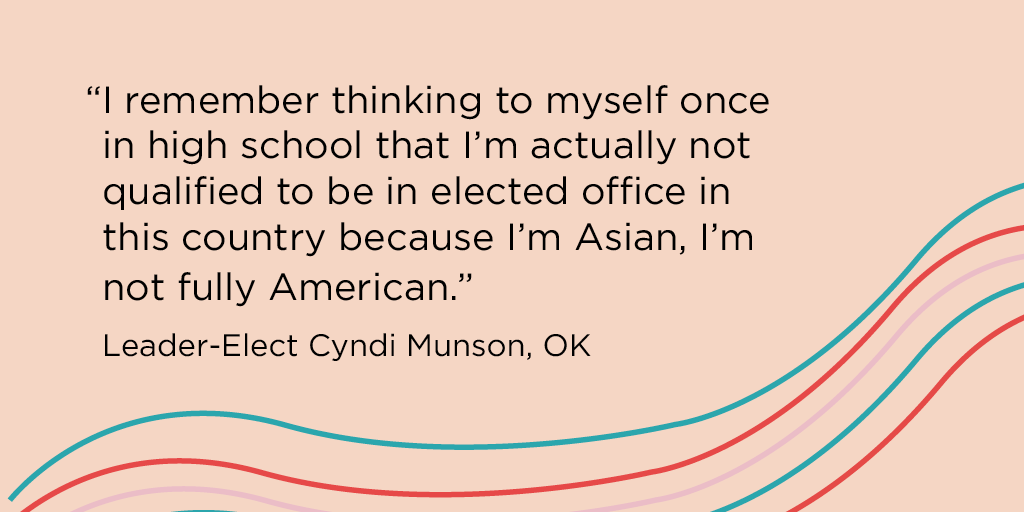
I remember thinking to myself once in high school that I’m actually not qualified to be in elected office in this country because I’m Asian, I’m not fully American. I remember having those thoughts in my mind. I remember comments after I was elected. It was everywhere that I was the first Asian American woman to be elected to the legislature and there were comments of, “Well that’s not really true because you’re not fully Asian, you’re just half Asian.” It’s interesting how people perceive you and then how you embrace your own identity around all of that. The things that we pick up on when we’re younger, like the lunch that you brought to school, the things that my mom said, the things that my mom prioritized versus what my friend’s parents prioritized. Ultimately, being raised by my dad makes my whole life experience and perspective interesting as well.
I haven’t always connected to my Asian identity, but that is changing and I think when we’re all able to talk more like this — and especially being in positions of power and talking about how it shapes how we represent our communities and how we show up for work, it’s — I don’t know — it’s interesting. I could go on and on. Who knew that a pandemic would bring all those feelings and thoughts, and someone like Donald Trump, who had the most power in the world, would say something that would put so many people in danger. It’s really heartbreaking. I could talk about that forever as well. I am grateful that many of us have made the decision to embrace ourselves and embrace each other to find a way forward to be stronger and to lead efforts across this country and in our state legislatures to improve everyone’s lives and to highlight the amazing things that immigrants and immigrant families contribute to our community that often goes unseen.
Delegate Tran: I think that’s the other hard part about it, particularly for Asian American and Pacific Islanders who’ve been so much of the essential workers during this pandemic. From being health care providers to restaurant workers and owners to being in the biotech industry — all across the range of essential occupations to help get us out of this pandemic. And for some of these individuals to face daily intimidation and daily comments questioning their Americanness, questioning whether or not they belong, I think has just added a lot more salt to this wound.
I think representation is really important. Cyndi was talking about that. You can’t be what you never see. Even for me, as an adult, I always get serious chills when I’m in a room of really amazing Asian American women because I’ve spent a lot of my life not in that space — even though I grew up in southern California, which has a large Asian American population. I didn’t see it a lot in college, in all my different workplaces. Our ability to lift up and support diverse candidates who bring different perspectives and life experiences to the table and have a different understanding of policy making — these words on a page, how they can affect families and communities in such different ways, I think is so critical. I’m really excited to meet Cyndi and celebrating my network of badass women leaders is really important to me. I’m so glad that you helped make that connection and we look forward to staying in touch. Also, to make sure that we are lifting up women — AAPI women — running for office.
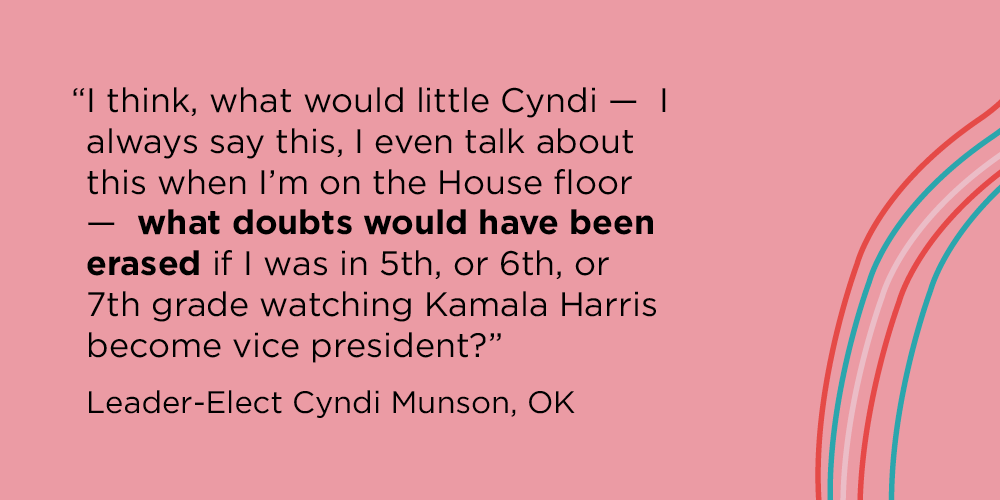
Leader-Elect Munson: After Kamala Harris was elected vice president, and during the inauguration, to see the first Asian American woman on the screen, just hit me in a way. You don’t realize how meaningful it is for you until you’re actually able to see it. I didn’t really follow Vice President Harris’s career before she started getting into the national scene. I’ve devoured her book, I’m constantly looking up what she’s doing. It really is an inspiration. I think, what would little Cyndi — I always say this, I even talk about this when I’m on the House floor — what doubts would have been erased if I was in 5th, or 6th, or 7th grade watching Kamala Harris become vice president? Would I have had the same doubts that I had as I was going into high school and college and thinking about public service?
I worked for the Girl Scouts prior to running for office so the piece about what you just said Kathy — about representation mattering and you can’t be what you can’t see — was something we always talked about in the work that I was doing and it is something I continue to carry with me as I serve in the legislature. It’s so true — you’re so limited until you see someone else do it and once you see them break that barrier and they overcome that obstacle it’s so empowering. I was just sitting on my couch sobbing thinking we are capable of doing absolutely anything and everything. When we look in the mirror and see the difference from our colleagues — that is a gift, that is a power. That’s something we should be proud of and not something we should be ashamed of.
We’re doing much more just by taking up that space for young people to see. I’ve had many young Asian American women, high school students paging this year, and they just come running to me saying, “I want to do what you’re doing. I’m so glad I get to see someone that looks like me.” When I was their age, the person I paged for was an older white man! What I would give to be those young women, to have someone like me to look up to — and I never take it for granted. That’s truly what keeps me going on the hardest days — that I know someone else is watching. It requires me to get up and fight and get over whatever I need to get over and do the work.
Delegate Tran: Before we go I want to tell you a quick story about my daughter, Charlotte. When I was elected in 2017, she was seven years old. And so my kids sometimes play House of Delegates during dinnertime. They came and sat in the gallery section and when they came home they were like, “Mr. Speaker, Mr. Speaker, I rise!” And Charlotte looked at me and asked, “Has there ever been a woman speaker?” I said, “We have never had one in Virginia, but yes, there could be one.” And so when we won the majority in 2019, we elected Eileen Filler-Corn to be our speaker, the first woman speaker in Virginia’s history, in 400 years. They came down and saw her, and then they were playing House of Delegates again one dinner, and the boys were like “Oh I get to be the speaker! I get to be the speaker!” And Charlotte says, “It is my turn to be the speaker, because Ms. Eileen is the speaker, and she’s a woman, and now I get to do that.” And you know, it’s exactly like what you were saying Cyndi, when kids see it, they imagine that they can be it, and then it’s limitless what their future is going to be. It’s really exciting.

